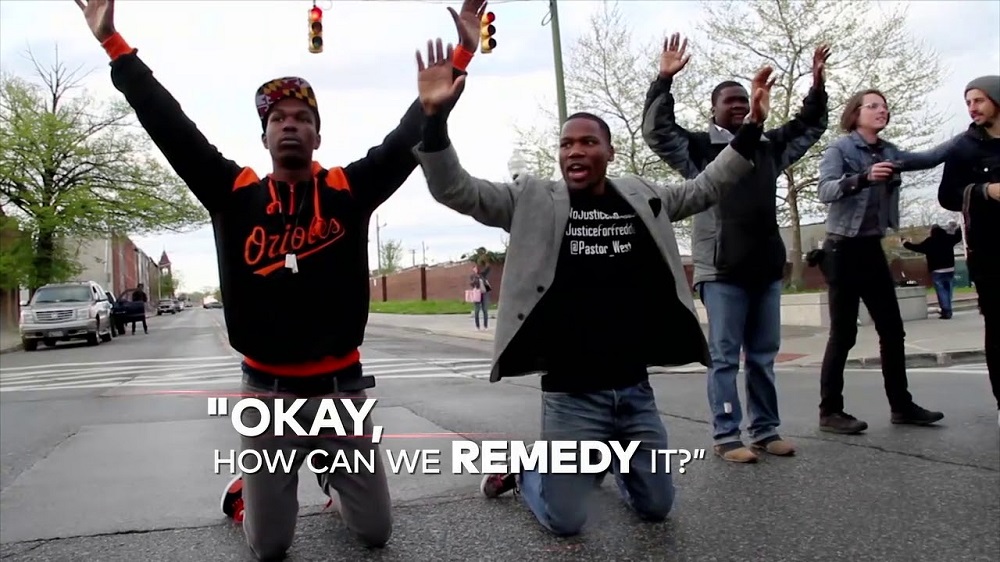
While Academy and Emmy Award winner Viola Davis knows how to make a flawed character likable on television, she also knows she doesn’t have all the answers as she proves in her docu-series “Two Sides,” which shines a bright light on fatal police encounters with black men and women.
The actress surely knows how to make an audience see into the heart of a character, whether a burdened mother in “Doubt” or the flawed attorney in “How to Get Away with Murder.”
Now she hopes the same holds true for the critical issue examined by the documentary series “Two Sides,” the deaths of African-American men and women in confrontations with law enforcement.
“Two Sides,” a four-part series, will begin Jan. 22 on the TV One network and was co-executive produced and narrated by Davis. Focusing on the higher profiled controversial cases of officer-involved deaths, each one-hour episode offers comprehensive insight into the fatal encounters involving Eric Garner in New York, Ezell Ford in California, John Crawford in Ohio, and Sandra Bland in Texas — all occurring within a one year span.
It takes more than a video clip to understand a violent encounter, said Davis, an executive producer and narrator of the TV One program airing at 10 p.m. EST on consecutive Mondays through Feb. 12.
“Despite the fact that so many were caught on camera and so much in the public consciousness, it caused a divisiveness” instead of a determination to find common ground and solutions, Davis said. “We actually need to do something, but it never got to that point.”
As the series’ title suggests and Davis contends, the crisis demands an understanding of what officers and citizens face and, beyond that, the system enveloping them.
Among the cases examined in “Two Sides”: Ezell Ford, 25, fatally shot during a 2016 struggle with two Los Angeles police officers; John Crawford III, 22, shot by officers while carrying an air rifle at a Wal-Mart store in a Dayton, Ohio, suburb; Sandra Bland, 28, who hanged herself in a Hempstead, Texas, jail cell after being arrested during a traffic stop and whose family disagreed with the ruling of suicide.
“People have to know that these victims also were people who were not born under a rock… and this is a way of humanizing these victims and not just making them a statistic,” Davis said during a behind-the-scenes interview filmed during production. “What this show does is it arms you with as much information, even information you probably didn’t want to hear when the incident happened.”
In each episode, law enforcement experts and independent observers discuss the circumstances of the deaths, including explanations of police regulations and procedures, and relatives and friends share memories of those who died and the impact of their loss.
“Our goal is to bridge the gap between white, black, and blue and to really spark these conversations,” co-executive producer Lemuel Plummer told Movie TV Tech Geeks. “That is the hope that this show will be able to bridge the gap and spark conversations.”
“Producing the polarizing subject matter presented various degrees of difficulties for the production team,” Plummer added, noting that there were “thousands of cases, incidents that happened, for years. “We had a hard time really selecting those, but we were able to overcome all of those challenges to get the right people to participate, and they trusted us to give them a fair shot, share their perspective without a biased approach and balance the show out which we’ve been able to do.”
The Rev. Al Sharpton, U.S. Rep. Maxine Waters of California and Christopher Darden, a prosecutor in O.J. Simpson’s murder trial, are among those offering commentary along with law enforcement agency representatives.
What officers face in the line of duty and what they risk must be taken into account, Davis said.
They have families, and they want to go home safely at the end of their shift, she said. And, like any other citizen, Davis said, she herself depends on law enforcement for protection.
“Listen, if I’m in trouble I’m going to call 911, I’m going to need the police,” she said. But society tends to believe that police and others in positions of authority should not be questioned and that if “you’re on the other side, then you’re wrong.”
“Whereas I believe on both sides there is room for growth, and to be challenged and questioned,” said Davis, who produced the docu-series with her husband, Julius Tennon, and Lemuel Plummer.
“We jumped on board with these guys because it’s the topic that’s been going on over the last several years, probably forever,” he said. “Social media has made us be able to see things more, but it was certainly great for Lemuel and his team to bring it to us. We saw the need to be involved, so we got involved.”
She has the visibility and clout to throw behind such a project: She was Oscar-nominated for 2008′s “Doubt” and 2011′s “The Help,” won the trophy last year for “Fences,” and received an Emmy for her role in the ABC legal drama “How to Get Away with Murder.”
Davis dismisses the idea that she has solutions to stop the repetitive violence — “I’m an actor. It’s not my skill set” — but she has hope.
“We have to come to some kind of middle ground,” she said. “It just hasn’t happened.”

